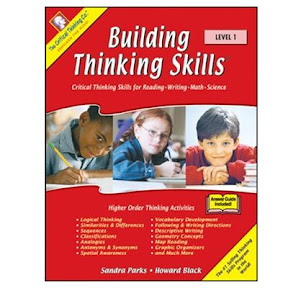 Critical Thinking, Higher Order Thinking, Logic
Critical Thinking, Higher Order Thinking, Logic
These are popular words among educators. I count myself among educators who are interested in these topics. And when you think about it, isn’t the ability to think the highest priority in education? Most people recognize that knowledge without the ability to apply it isn’t very valuable.
But how do we teach children to think?
One way is to demonstrate thinking skills across all subjects and throughout daily life.
- Explain to your children how you make certain choices.
- Point out similarities and differences.
- Make comparisons.
That probably is the single most important way to teach critical thinking.
But there are also very good reasons to add specific training in thinking skills. One reason is for improved test scores. That is probably not the highest priority to homeschoolers, who want to avoid “teaching to the test” like many public schools are forced to do. However, tests are a very important part of college entrance requirements–especially for homeschoolers, because colleges use the test scores to validate the transcripts.
Using a critical thinking program can also provide information to the teacher/parent about how well the student is grasping concepts. Then weak areas can be strengthened before the student is studying topics that require those types of thinking skills.
I was given the opportunity to review Building Thinking Skills Level 1 by Timberdoodle. I have used other products by The Critical Thinking Co. before (including Level 2 of this same series), so I was reasonably confident that I would approve of this product. The only reason I doubted at all was because of the particular child that I planned to use this with.
He’s my most difficult child. The one that I think is dyslexic. And ADHD. And… Well, I’ll stop with the labels. Especially since none of them are official. Let’s just say this son of mine (almost 9) is not fond of school work and has struggled. And I have struggled. But honestly, of all my children, he needs to work on his thinking skills more than any of the others.
So we started with Chapter 1, Describing Shapes. I figured it would be a little too easy, after all, he knows his shapes. Wrong! It wasn’t easy for him. I had to explain to him what a square corner was. We had to talk about the first several pages together. I showed him how to count the number of sides and the number of angles. But, he finally got it!
I also discovered that he had real trouble with following directions. (Actually I knew that already. How could I not?) But these simple worksheets gave him the chance to practice following directions and giving directions.
I have found that Building Thinking Skills Level 1 is a terrific product for him. I love that the worksheets are short. We’re talking 5 minutes at most. The program is very sequential with each page requiring a greater understanding than the previous one. And believe it or not they’ve been real confidence builders for my son. Although the concepts have been hard for him at first, after he understands, he is able to complete further pages without much assistance.
You may have noticed I’ve been calling these worksheets. That is another great aspect of this program. The book is quite large (364 pages!) but the pages are perforated for easy removal. There are no problems with writing near the center of the book or trying to hold it open. And permission is granted to reproduce the pages for use within your home. So I’ve been making copies so that I can use this book again.
If you’re looking for a way to teach and reinforce thinking skills, you should definitely look at Building Thinking Skills. And while you’re at Timberdoodle.com, you can see their huge selection of thinking skills products.
Linked to: The Homeschool Curriculum Review Roundup.
Disclosure: As a member of Timberdoodle’s Blogger Review Team I received a free copy of this book in exchange for a frank and unbiased review.

By Kristen H.


Thanks for reviewing this! I’ve been looking into this series recently and love seeing a current review of it!